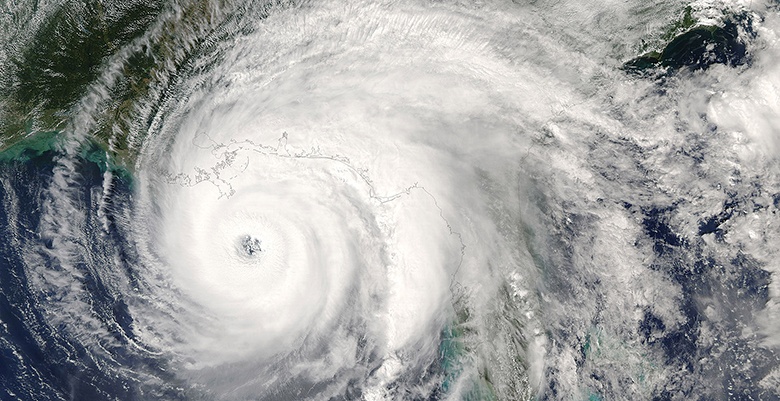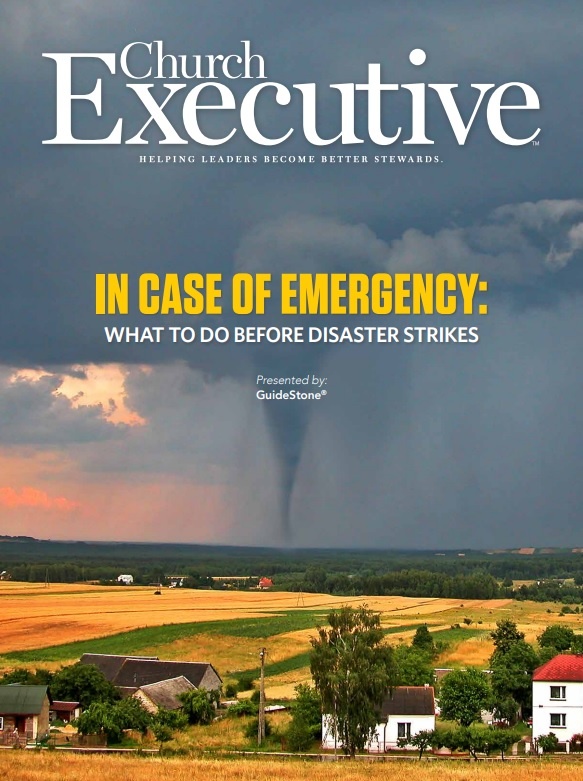
What to do before disaster strikes
By John Murphy
Hurricanes, wildfires, tornadoes, extreme heat, drowning, cyber-attacks and financial crises are a few words that strike fear in our hearts because we care about life, and we care about each other. As Christians, we are called to love our neighbors as ourselves.
We know disasters will come, so what should we do to ensure we can all be resilient through the storms?
It’s hurricane season in the Gulf of Mexico from June through November. I vividly remember Hurricane Harvey devastating the Gulf Coast. After the storm, a pastor of a church in Houston expressed that he was working through three difficult seasons of life:
• Caring for an ill family member
• Contemplating the next steps for his devastated church buildings
• Shepherding his congregation, who was looking to him for support and spiritual answers
He did not feel prepared, but the Lord sustained him through it, and today, he would likely reflect and say:
The Lord doesn’t call the prepared; he prepares the called

After working with thousands of ministries through disasters, I have learned a few things that I believe every ministry should know:
#1: Communicate
Communication and an effective alert system are essential to your disaster preparation plan. Every ministry needs a weather radio. Every ministry needs fire alarms. Every ministry needs to know the safest spaces to move people in case of a sudden storm. With today’s technology, ministries should use a pre-determined system to alert members and attendees of danger and closures. The communication doesn’t need to be fancy, but it should be multi-channel, using email, text, phone calls and social media (if applicable).
Once a plan is in place, the alert and communication system should be tested regularly.
#2: Mitigate
Ministries should consider the types of potential disasters in their area and then work to mitigate the risks. Risk mitigation is the action of reducing the severity, seriousness or painfulness of an occurrence, and insurance should be considered to cover potential property and liability exposures.
Here are a few ideas to protect against some of the biggest claims seen in the industry:
• Add water sensors to buildings
• Train security teams to protect against active threats
• Enact child sexual abuse prevention training with corresponding, clear policies in place
• Secure doors with cameras and magnetic locks
#3: Cooperate
Cooperation is key in rebuilding a ministry after a disaster. Nothing brings people together like a crisis. Having a pre-determined plan and standing relationships with relief ministries to work with, should disaster strike, is a smart way to prepare for disaster and be able to rebuild a community quickly. Such disaster relief ministries include Send Relief, Samaritans Purse, the American Red Cross, Carpenters for Christ, Builders for Christ and your local fellow churches.
#4: Elevate
In my experience, the most beautiful part of any disaster is when a community sees revival because God’s people respond correctly. There are three ways we should respond to disasters:
1) We should repent. I believe every hard situation in life reminds us that this world is not our home. We look forward to heaven, and when we look at heaven, we should see the holiness of God, repent of our sins again, and ask the Lord to help us.
2) We should minister. As believers, ministry is at the core of what we do. We should see disasters as opportunities to help and minister to the hurting. We will often have needs of our own when a disaster strikes, and, in those cases, we should love our own well and ask for the strength to minister to others. When disaster strikes our neighbors, we should be the first to help.
3) We should persevere. James 1:2-4 says, “Count it all joy, my brothers, when you meet trials of various kinds, for you know that the testing of your faith produces steadfastness. And let steadfastness have its full effect, that you may be perfect and complete, lacking in nothing.”
As a church safety advocate and coverage provider, GuideStone believes that investing in a disaster preparation plan allows people to feel protected and loved by your ministry so you can continue to serve your congregation and community confidently.
For dedicated ministry security resources and videos, visit GuideStone.org/ChurchSafety.
John Murphy, Managing Director, GuideStone®, is a licensed insurance professional with a passion and calling to lead GuideStone Insurance teams with integrity and excellence. Murphy has served at GuideStone since 2012.
In addition to helping GuideStone members and ministry partners, Murphy plays an active role in his church and community and has served as a deacon. Having grown up as a missionary kid, he enjoys leading and participating in mission trips worldwide.
He is passionate about seeing local churches thrive, make disciples and impact the globe for Christ. He relies on biblical principles to guide him, which is reflected in his favorite Bible verse: “The Lord is the one who will go before you. He will be with you; he will not leave you or abandon you. Do not be afraid or discouraged.” Deuteronomy 31:8 (CSB)


